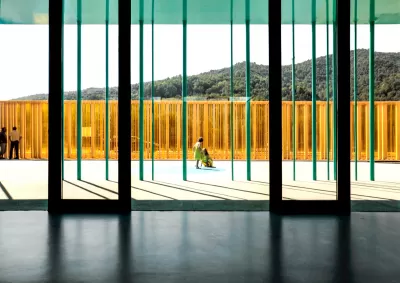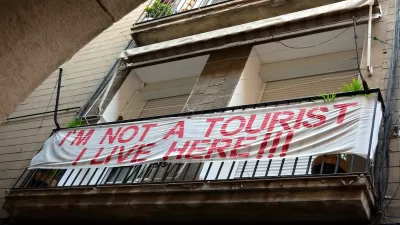The Pritzker Prize, sometimes called the Nobel Prize of architecture, was announced this week, going to Spanish firm RCR Arquitectes.

"For the first time, three architects have jointly won the Pritzker Architecture Prize, the field's highest honor," reports Blair Kamin. "A relatively unknown team from Spain, two men and a woman, are the 2017 honorees, the prize's organizers announced Wednesday."
"Making their selection doubly unusual, the architects — Rafael Aranda, Carme Pigem and Ramon Vilalta — practice not in a glittering metropolitan center but in the small Catalonian city of Olot, some 70 miles northeast of Barcelona," adds Kamin.
As usual, the design media covered the news of the Pritzker Prize widely. Christopher Hawthorne wrote an article noticing that the selection of RCR Arquitectes "seems a pointed response to globalization and the contemporary political climate." Hawthorne cited the award jury itself for the connection—the jury described the firm's work as an "approach that creates buildings and places that are both local and universal at the same time." Hawthorne expands that central conceit by saying the jury citation in announcing that award "suggests that the fear underlying those [Brexit and presidential election] votes is not only justified but might be addressed and even tempered by a different approach to cultural production, beginning with architecture." The work of RCR, according to the jury, offers a bridge between the local and the global.
Nicki Mafi provides additional coverage of the Pritzker Prize jury's reasoning for the selection, describing RCR's work as "an embrace of multiculturalism through the prism of design." Mafi notes that the award has never gone to a trio, and thus "the Pritzker jury acknowledged the importance of collaboration in an increasingly divided world."
For articles focusing more on the results of RCR's labor, see a "project roundup" with lots of full-sized, colorful images, in designboom. Dezeen also shares and comments on four short films produced by the Pritzker Prize, the first of which can be viewed below.
FULL STORY: Rafael Aranda, Carme Pigemand Ramon Vilalta Receive the 2017 Pritzker Architecture Prize

Planetizen Federal Action Tracker
A weekly monitor of how Trump’s orders and actions are impacting planners and planning in America.

Map: Where Senate Republicans Want to Sell Your Public Lands
For public land advocates, the Senate Republicans’ proposal to sell millions of acres of public land in the West is “the biggest fight of their careers.”

Restaurant Patios Were a Pandemic Win — Why Were They so Hard to Keep?
Social distancing requirements and changes in travel patterns prompted cities to pilot new uses for street and sidewalk space. Then it got complicated.

Platform Pilsner: Vancouver Transit Agency Releases... a Beer?
TransLink will receive a portion of every sale of the four-pack.

Toronto Weighs Cheaper Transit, Parking Hikes for Major Events
Special event rates would take effect during large festivals, sports games and concerts to ‘discourage driving, manage congestion and free up space for transit.”

Berlin to Consider Car-Free Zone Larger Than Manhattan
The area bound by the 22-mile Ringbahn would still allow 12 uses of a private automobile per year per person, and several other exemptions.
Urban Design for Planners 1: Software Tools
This six-course series explores essential urban design concepts using open source software and equips planners with the tools they need to participate fully in the urban design process.
Planning for Universal Design
Learn the tools for implementing Universal Design in planning regulations.
Heyer Gruel & Associates PA
JM Goldson LLC
Custer County Colorado
City of Camden Redevelopment Agency
City of Astoria
Transportation Research & Education Center (TREC) at Portland State University
Camden Redevelopment Agency
City of Claremont
Municipality of Princeton (NJ)





























